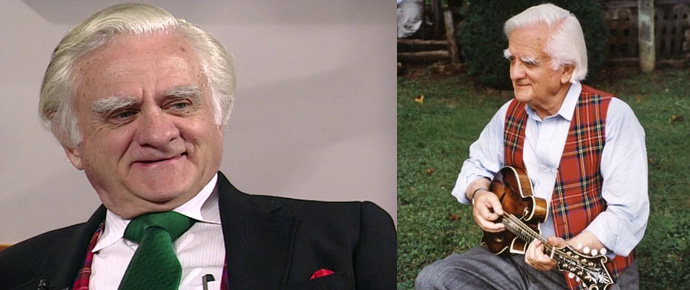
John Rice Irwin, cultural historian, writer and the founder of the Museum of Appalachia, passed away in Clinton, Tennessee, on January 16, 2022, at 91-years-old.
He travelled the back roads and collected thousands of everyday items from the colorful mountain folk of Southern Appalachia, becoming one of the area’s leading authorities on pioneer-frontier culture.
Irwin was born on December 11, 1930, in Union County, Tennessee. While Irwin was still a toddler, his family was forced to move from their farm to make way for the flooding of Norris Lake and the construction of the Norris Dam. They first settled in Robertsville, but the Manhattan Project forced them to move yet again, this time to a farm near Norris, where he learned how to farm, fish, hunt, and trap animals.
For as long as he could remember, Irwin was captivated by the rich cultural history of East Tennessee and its people. As a young boy, he would sit at the feet of his grandmother, Ibbie Jane Rice, and grandfather, Marcellus Moss “Sill” Rice, and listen intently to their stories of the past. Sill took notice of his grandson’s fascination and presciently said to him, “You ought to keep the old-timey things that belonged to our people and start you a little museum sometime.” It was this advice that would ultimately inspire Irwin to create the Museum of Appalachia.
After graduating from high school he served in the United States Army, and was stationed in Germany during the Korean War. After his discharge, he returned to east Tennessee, and using the G.I. Bill he continued his education, obtaining a BA in History while at Lincoln Memorial University in Harrogate, Tennessee, and, later, an MA in International Law from the University of Tennessee.
Irwin taught for several years in both public schools and colleges, and in 1962, Irwin became the youngest superintendent of schools in the state when he was elected to the position in Anderson County at the age of 31.
All the while, Irwin spent his free time traveling throughout the hills and hollers of Southern Appalachia collecting “old-timey things” and, more importantly, the stories behind them. Irwin bought a historic cabin and re-erected it on his family property in Norris. With the utmost attention to detail, he tried to recreate what the cabin would have looked like when it was first built in 1898.
Before long, the Irwin family welcomed friends and visitors to view their unique collection. It became so popular that it disturbed the Irwin family’s daily life, so they began charging a nominal fee. The Museum of Appalachia officially opened in 1969 and would welcome some 600 visitors during that year. Today, the museum regularly greets tens of thousands of guests per year.
In 1980, Irwin retired from teaching and devoted all his time and effort to developing the Museum. With the help of his family, Irwin’s Museum would eventually grow to house 35 log structures, including the Mark Twain family cabin, plus three large exhibit buildings that now house over 250,000 authentic Appalachian artifacts.
Irwin also hosted special events at the Museum, including the Tennessee Fall Homecoming—a music and heritage festival that took place for almost 40 years. Its headliners have included Doc Watson, Ralph Stanley, Mac Wiseman, Janette Carter, Rhonda Vincent, and Doyle Lawson & Quicksilver.
During the 1980s that the Museum’s popularity increased dramatically, largely due to the promotion and praise of notable Tennesseans like then-Governor Lamar Alexander and Alex Haley, author of the book, Roots: The Saga of an American Family.
In 1989, Irwin won a MacArthur Foundation fellowship, which he used to build the Museum’s Hall of Fame. He received a variety of awards throughout his career, including honorary doctorates from Lincoln Memorial University, Carson-Newman University, Jefferson City, Cumberland College and Tusculum University, Greeneville, Tennessee.
Irwin published numerous books on tenets of Appalachian life, including baskets, guns, quilts, and music. A 20-year friendship with a remarkable Tennessee mountain character led to the publishing of his most popular work, Alex Stewart: Portrait of a Pioneer.
Irwin operated the Museum until it was converted to a 501(c)3 non-profit organization in 2003. He served in an advisory role for the next decade, during which the Museum became an official affiliate of the Smithsonian Institution.
When asked about his friend’s passing, Lamar Alexander said ….
“John Rice Irwin displayed Appalachian pioneer history in a way that no one else ever has. His tens of thousands of items in the Museum of Appalachia remind us that we don’t have to go outside our own backyards to find interesting people. For 60 years he stayed up late into the night writing books and matching artifacts with stories so that we could better understand who we are. He taught us about ancestors who made or grew things instead of buying them. He was an engaging genius and a generous friend.”
Irwin dedicated his life to preserving the rich heritage of the people of Southern Appalachia, and nothing would please him more than for that preservation to continue for generations to come.
Donations made in memory of John Rice Irwin may be made to the Museum of Appalachia, P.O. Box 1189, Norris, Tennessee 37828.
R.I.P. John Rice Irwin
A graveside service will be held at Norris Memorial Gardens, off US-441 S (Norris Freeway) in Clinton, Tennessee at 3:30 p.m. on Thursday, January 20, 2022. The procession will leave from Holley Gamble Funeral Home in Clinton, Tennessee at 3:00 p.m.
A celebration of the life of John Rice Irwin will be held at the Museum of Appalachia in Clinton on Sunday, April 24, 2022, at 2:00 p.m.
Book List
- The Story of Marcellus Moss Rice and His Big Valley Kinsman (1963)
- A Brief History Of The Arnwine Cabin And The Pioneer Artifacts It Contains: One of Thirteen Such Structures Located in the Museum of Appalachia (1973)
- Baskets and Basketmakers in Southern Appalachia (1982)
- Musical Instruments of the Southern Appalachian Mountains (1983)
- A People and Their Quilts (1983)
- Guns and Gunmaking Tools of Southern Appalachia (1983)
- Alex Stewart: Portrait of a Pioneer by John Rice Irwin (1985)
- A People and Their Music: The Story Behind the Story of Country Music (2000)
- The Unlikely Story of the Museum of Appalachia and How it Came To Be (2012)
“When an elder dies, a library burns to the ground.” – African proverb








